Cities around the world are failing to achieve progress toward their sustainability and public health goals, new research finds.

New research from Brookings indicates that, around the world, “City leaders and their partners must do more to build healthy and sustainable places.” Geoff Boeing describes the project, which developed a set of tools for consistently calculating urban sustainability indicators.
According to their results, “Cities often adopted policies that: 1) were inconsistent with public health evidence; 2) were far more likely to use rhetoric that endorsed health and sustainability goals than adopt measurable policy targets; and 3) left substantial implementation gaps.”
The researchers examined walkability and accessibility in cities around the world, finding that “Older inner cities tend to be more walkable; newer outer suburbs less so. High-income European cities tend to perform well, while high-income cites [sic] in the U.S., Australia, and New Zealand tend to perform poorly.” The study also looked at access to public transit stops and healthy food stores, finding that U.S. cities performed poorly in those areas as well.
According to Boeing, “Our study developed open-source software and open data in conjunction with local collaborators so that, for the first time, city leaders can both benchmark their progress against other cities and monitor that progress over time.” The researchers say they hope having measurable standards can help cities set concrete targets for building healthier cities and share knowledge and resources for achieving them.
FULL STORY: Around the world, cities are falling short on health and sustainability goals

Planetizen Federal Action Tracker
A weekly monitor of how Trump’s orders and actions are impacting planners and planning in America.

San Francisco's School District Spent $105M To Build Affordable Housing for Teachers — And That's Just the Beginning
SFUSD joins a growing list of school districts using their land holdings to address housing affordability challenges faced by their own employees.

The Tiny, Adorable $7,000 Car Turning Japan Onto EVs
The single seat Mibot charges from a regular plug as quickly as an iPad, and is about half the price of an average EV.

Seattle's Plan for Adopting Driverless Cars
Equity, safety, accessibility and affordability are front of mind as the city prepares for robotaxis and other autonomous vehicles.

As Trump Phases Out FEMA, Is It Time to Flee the Floodplains?
With less federal funding available for disaster relief efforts, the need to relocate at-risk communities is more urgent than ever.

With Protected Lanes, 460% More People Commute by Bike
For those needing more ammo, more data proving what we already knew is here.
Urban Design for Planners 1: Software Tools
This six-course series explores essential urban design concepts using open source software and equips planners with the tools they need to participate fully in the urban design process.
Planning for Universal Design
Learn the tools for implementing Universal Design in planning regulations.
Smith Gee Studio
City of Charlotte
City of Camden Redevelopment Agency
City of Astoria
Transportation Research & Education Center (TREC) at Portland State University
US High Speed Rail Association
City of Camden Redevelopment Agency
Municipality of Princeton (NJ)





























